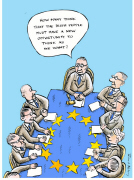The following documents outline the position of the People's Movement in relation to the EU constitution which was rejected by the voters but has now been revived under the alias of the 'Lisbon Treaty':
Referendum result not an endorsement of the Lisbon Treaty

Some of the referendum posters that promised us work, jobs, safety and recovery once the Lisbon Treaty was passed.
Responding to the result of the second referendum on the Lisbon treaty, the People's Movement pointed out that the 'Yes' vote was 'not a vote of support for the Lisbon Treaty and the new Europe it establishes, but instead a vote for economic recovery, jobs and stability'.
The Movement stated that the referendum result shows that a need exists for 'new political forces untarnished by corruption, greed, and the ideology of power-for-power's-sake'. The statement can be read in full here.
Electorate bullied into 'Yes' vote - CAUEC
The Campaign against the EU Constitution (CAEUC), to which the People's Movement is affliliated, has issued a press statement in reaction to the result of the second referendum on the Lisbon Treaty.
In its statement, CAUEC stated that the result had been achieved by 'anti-democratic means' and pointed out that the Lisbon Treaty will 'drive cuts in public spending and make the recession worse'. The statement can be read in full here.

People's Movement takes to the streets

Members of the People's Movement campaigning outside the GPO in central Dublin.
Members of the People's Movement have taken to the streets to explain that the Lisbon Treaty would mean more health cuts, would restrict workers' rights, and would transfer power to Brussels.
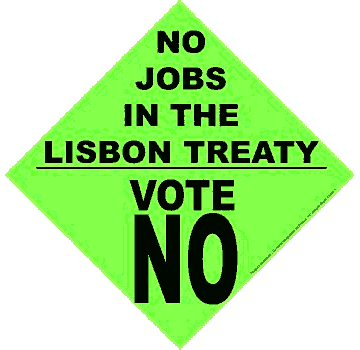
Green Party leader engaged in a cynical exercise
Patricia McKenna, chairperson of the People's Movement, has accused the leader of the Green Party, John Gormley, of abusing his position as minister for the environment in order to secure a 'Yes' vote on the Lisbon Treaty. Read the press statement in full here.
Women say 'No' - again
At its final press conference held in Dublin on Wednesday, 30 September, the group 'Women Say No to Lisbon' issued a press statement arguing that the Lisbon Treaty 'is out of date and out of step. It's time for a change of direction. It's time to say No - again'. Read the statement in full here.
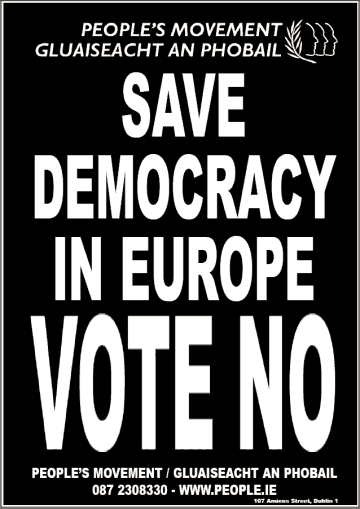
An open letter to the Referendum Commission
In an open letter addressed to the chairman of the Referendum Commission, Professor John Maguire writes that 'An institution, originally envisaged as furthering the people's deliberation by profiling the range of arguments, has been recast into a means of evaluating them and rebutting, or at least sidelining, those deemed to be irrelevant or erroneous'. Read the letter in full here.
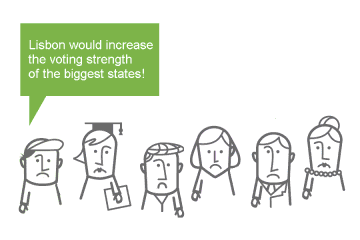
Lawyers oppose the Lisbon Treaty
'The idea that transnational corporations expect us to change our Constitution for some altruistic reason to do with jobs is a bad joke' - so said solicitor Joe Noonan at a Dublin press conference called by lawyers opposed to the Lisbon Treaty. A press statement is available here; for a commentary by Joe Noonan on the proposed constitutional amendment see here.
Lisbon and the economy
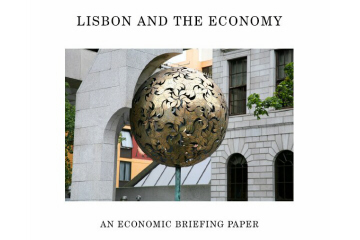
A new paper by the People's Movement considers the connection between the economic crisis and the Lisbon Treaty - a treaty which perpetuates the failed economic, financial and monetary policies that led to the crisis.
Download a copy of the paper here.
The so-called 'guarantees' re-examined
A new report from the People's Movement examines the so-called legal 'guarantees' obtained by the government and concludes that absolutely nothing has changed in the Lisbon Treaty; read the report here.
A leaflet has also been issued on the same subject and is available here.
Implications of the Karlsruhe ruling

A new document from the People's Movement discusses the implications of the decision by the German constitutional court on June 30th that the Lisbon Treaty can be only ratified if the role of Germany's national parliament in scrutinising EU legislation is first strengthened. Read the document here.
German support for the Irish 'No'

The European spokespersons of Die Linke, the fourth largest party in the Bundestag, have called for a 'No' vote in the Lisbon referendum. Linking the recent decision of the German constitutional court on the Treaty with the Irish referendum on October 2, Diether Dehm declared that 'Karlsruhe has been the obsequies, Dublin will be the funeral'. Read the full statement here.
A press statement from the German constitutional court is available here and an English translation of its ruling on the Lisbon Treaty is available here.
Nordic solidarity

People's movements in the Nordic countries (Finland, Denmark, Sweden, Iceland and Norway) have issued a joint statement expressing solidarity with the Irish people in the run up to the second referendum on the Lisbon Treaty. The Nordic statement can be read here.
Lisbon and the fishing industry
The People's Movement has issued a warning about the damage that would be inflicted on the Irish fishing industry by the Lisbon Treaty. Read the Movement's statement here.
Lisbon would undermine the health system
The Lisbon Treaty would subordinate the health policies of EU member states to the rules of the market, undermining the principle of equal access for all to health care in the process. An article on the issue can be read here.
Democracy 2.0?
An article in which Jan Van De Ven discusses the implications of the proposed Lisbon 2 referendum for the future of democracy in Ireland can be read here.
Covenant launched
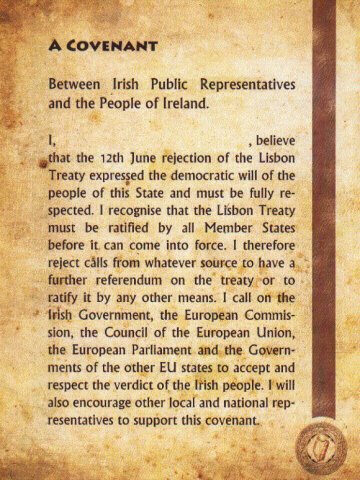
On September 24 the People's Movement launched a Covenant between Irish Public Representatives and the People of Ireland. The text declares that the signatories believe the referendum on the Lisbon Treaty 'expressed the democratic will of the people of this State and must be fully respected'. In addition to existing public representatives, candidates in next June's local and European elections will be invited to sign the document.
EU democracy examined
Prof. John Maguire, a patron of the People's Movement, critically examined the democratic credentials of the EU in an article that appeared in the Irish Times on September 11. The text of his article is now available in PDF format here.
Joe Noonan addresses the Humbert Summer School
Cork-based solicitor Joe Noonan, a patron of the People's Movement, delivered a paper entitled 'Life after Lisbon: sovereignty and justice' at the Humbert Summer School on 23 August 2008. A copy of the paper is available in PDF format here.
Statements by Danish and Swedish movements
Following the rejection of the Lisbon Treaty by the Irish people, the statements below have been received from the People's Movements of Denmark and Sweden.

Statement of the Danish People's Movement.

Statement of the Swedish People's Movement.
Loss of the agricultural veto
Barry Finnegan of the Campaign against the EU Constitution (CAEUC) has written an article explaining how Ireland has lost its veto on international trade deals in agricultural goods, and how the Lisbon Treaty would remove the veto on such deals in public services. Read the article here. It's content is summarised in a People's Movement document here.
A lawyer's look at the Lisbon Treaty
Joe Noonan, a solicitor who was called as an expert witness on foreign and security policy in the constitutional action taken by Raymond Crotty in 1987 which ensured that the Irish people would have the right to give their verdict on the Single European Act, has written a short document on the implications of the Lisbon Treaty - read it here.
New Afri pamphlet on the Lisbon Treaty
Action from Ireland (Afri) has published a pamphlet by Dr Andy Storey entitled The Lisbon Treaty, the European Military Project, and Europe's Role in the World: Implications for Irish Voters. For further details, see the Afri website here.
Lisbon Treaty to bind us to Euratom
For the first time, the pro-nuclear provisions of the Euratom Treaty will be legally and constitutionally binding on EU member states under the terms of the Lisbon Treaty. Read more here.
Lisbon Treaty
The full text of the renamed EU Constitution is available here. (Don't expect to be able to understand it - it was written with the intention of being as opaque as possible.)
Treaty of Lisbon
reviewed
A detailed analysis of
the Lisbon Treaty by
the People's Movement
Click on the image
above to download
your copy.
Charter of
Fundamental Rights
A critical examination of the so-called Charter of Fundamental Rights by the People's Movement.
Click on the image
above to download
your copy.
Nyberg print
This limited edition
print by Robert Nyberg,
Sweden's leading
cartoonist, is available
from the
People's Movement.
Click on the image
above for further
information.
Help us fight Lisbon II!
See the funding appeal here.
For sovereignty, democracy and social justice.



